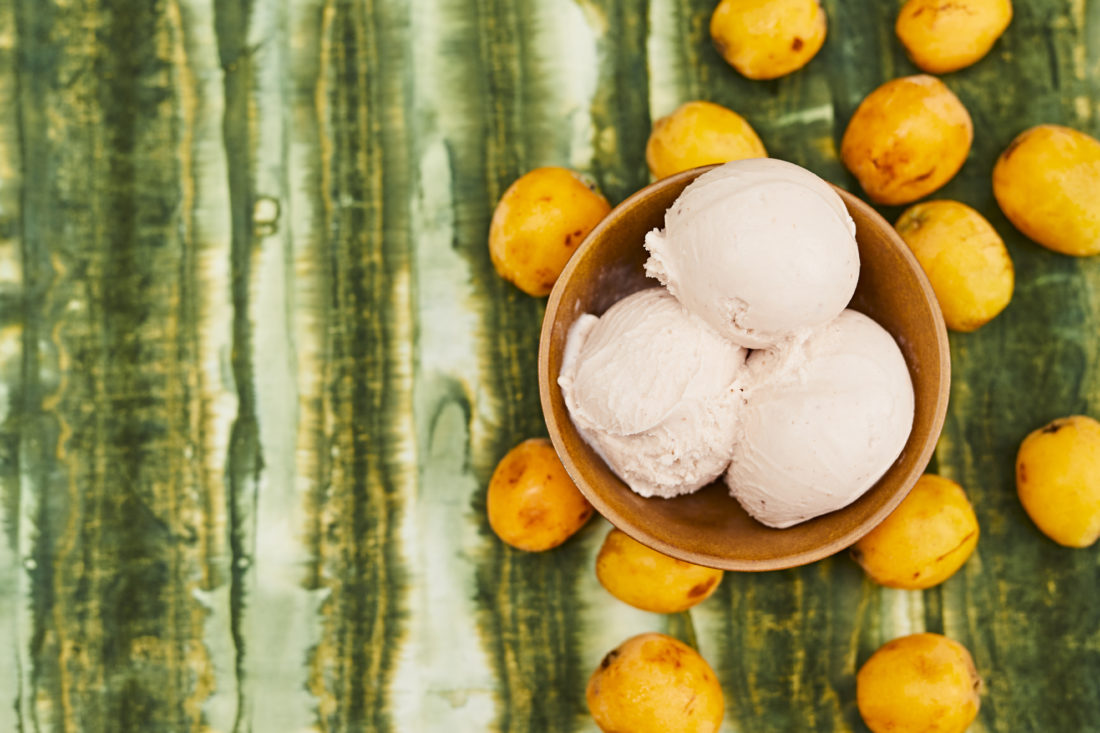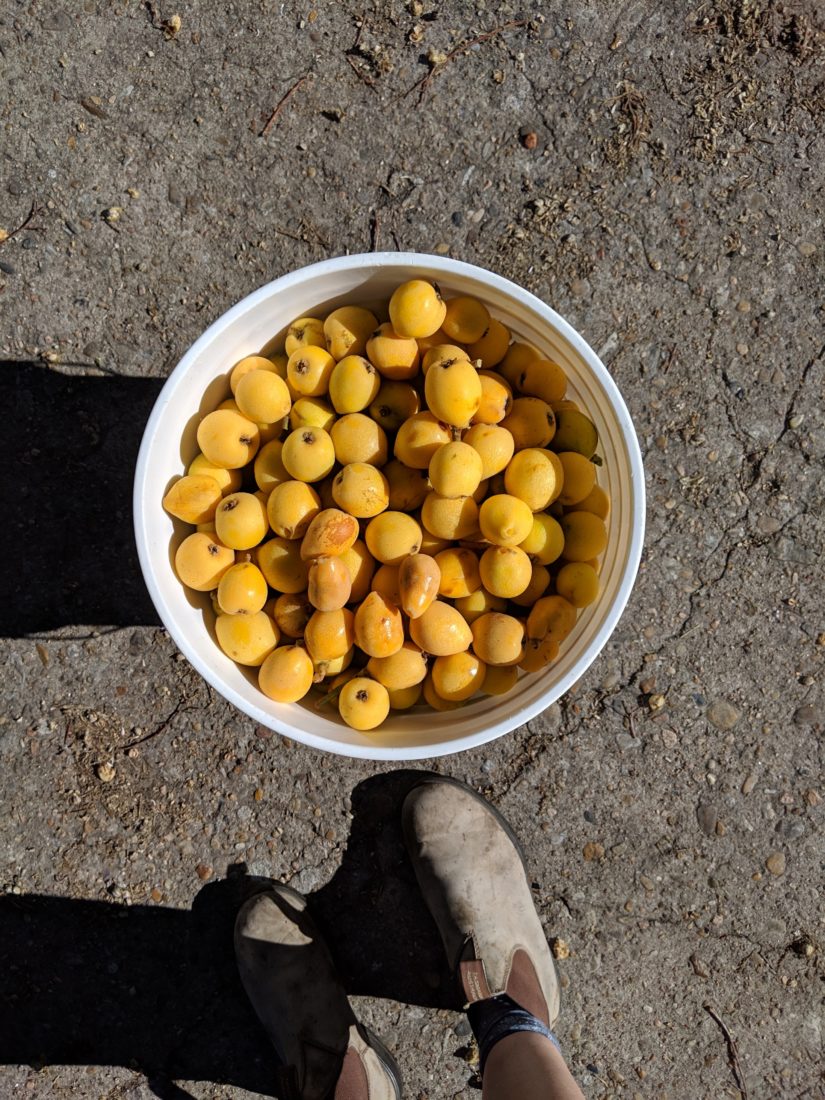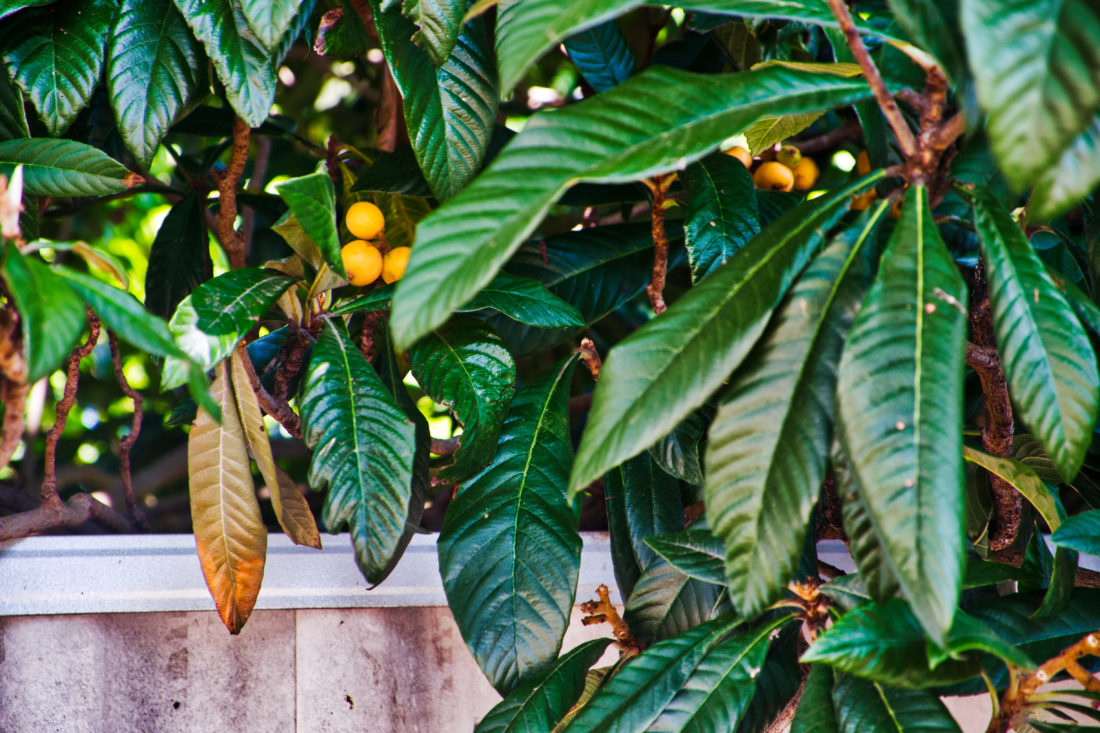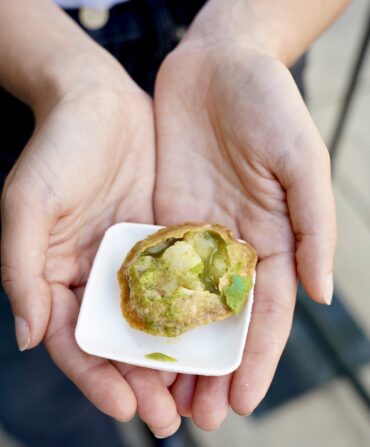The loquat—bright yellow, fragrant, and about the size of a cherry—dangles in clusters from trees like a colorful announcement of spring across the South. Akin to a peach crossed with an apricot, with a tart-yet-sweet finish, the fruit complements a cheese board, is excellent in a cocktail, or happily provides fodder for a jam jar. But many people don’t realize the little loquat is even edible.
The tree traces its ancestry to Southeastern China, and from there to Japan, where it has been cultivated for nearly 1,000 years. A cousin to the Japanese plum (though no relation to the kumquat, besides phonetics), in China, the Pipa fruit, as the loquat is known, is revered for its alluring fragrance. (In historic Chinese texts, you might find a brothel referred to as, “the Gate of the Loquat.”) In Italy, the trees are called Mespilia.
“I think that’s why we call them the misbelief trees here in New Orleans,” laughs the chef Kristen Essig, who co-owns the Garden District restaurant, Coquette, with partner/chef, Michael Stoltzfus. “Someone somewhere garbled that name Mespilia.”
We know loquats had arrived in America in Charleston, South Carolina, by the 1850s, thanks to the records of A. Pudgion, a botanist who sold the trees from his nursery on King Street. (An even earlier Holy City record dates the first loquat tree to 1838.) The trees thrive from North Carolina to Texas (USDA Growing Zone 8), and points south. With an average height of twenty-to-thirty feet, they’re especially well suited for urban environments.
For Essig, and many chefs and bartenders around the region, the loquat is underappreciated and under-utilized. It presents a seasonal bounty that many neighbors happily share and a fun moment of urban foraging for culinary creatives. Essig recently posted a request on Instagram, asking locals to donate their surplus. “Within hours, I had addresses of trees all over the city,” she says. “Some customers even brought them in by the bucket full.” Essig and Stolzfus have ample plans for both the seeds and the fruit—at Thalia, the restaurant they plan to open in New Orleans this June, a spritz will feature housemade loquat liqueur and dehydrated loquats which will go in a mostarda served with chicken liver pate.
Loquats are hitting other menus across the South, too. Here are six more restaurants and bars to try them before they’re gone.
Lick Honest Ice Creams
Austin & San Antonio, Texas
“We blend about one pound of loquat jam into every gallon of prepared ice cream,” says Anthony Sobotik, co-owner and chef. We add Dulce Vida tequila, Paula’s Texas Orange liqueur, and a bit of salt to before churning.” Lick’s Loquat Margarita ice cream is available online, too, through July.

Photo: Annie Ray
Loquat Margarita ice cream.
Jewel of the South
New Orleans
“Our tree is about twenty feet tall in the courtyard, and the branches provide the bulk of our canopy,” says barman Nick Detrich. He and his staff harvested, de-seeded, and soaked the pulp in vodka. Jewel’s Pipa Sour has loquat liqueur, Pierre Ferrand 1840 cognac, lemon, simple syrup, and an egg white. It’s served frothy, with a floater of tawny port.
Purlieu
Charleston, South Carolina
“I haven’t put them on the menu before, but this year, the crop was truly delicious,” says chef John Zucker. His beeliner snapper crudo has a halo of fresh loquats (foraged from a neighbor’s tree), crème fraîche, sliced serrano, and raw radish. He’s also added to the menu a beet and loquat dish, as well as a Low & Slow-Quat cocktail, with pilsner, loquat puree, vanilla-cinnamon simple syrup, and Aperol, served over ice.

Photo: Jonathan Boncek
Snapper crudo with loquats.
Pair o’ Dice Brewing
Clearwater, Florida
“We’ve been making our Life Loquatic since 2014,” says co-owner Julia Rosenthal, “and we freeze the fruit first. We find we can extract more flavor that way. It’s a very classic wheat beer, and you get a great burst of loquat flavor. It’s only on tap here at the brewery.”
The Hive
Bentonville, Arkansas
At this swanky dining room within the 21C Museum Hotel, the Friends in Lo Places cocktail begins four hours before service, when bartenders combine sugar, water, and diced loquat in vacuum bags to slow cook. The thick syrup gets shaken with Old Forester Signature 100 Proof bourbon, lime, and Kronan Swedish Punsch.
Texas Keeper Cider
Manchaca, Texas
Co-owner Lindsey Peebles put out a call on Instagram for loquats in early spring. “All of a sudden, I had a hundred-and-fifty people calling and begging me to come pick them up,” she says. “Our cider has finished fermenting and will age for four months. It will be available this fall in our taproom only. We don’t have a name yet, but it will be our first of a Forager Series. I came away from this experience loving loquats. What an awesome fruit.”

Photo: Courtesy of Texas Keeper
A haul of freshly foraged Texas loquats.








